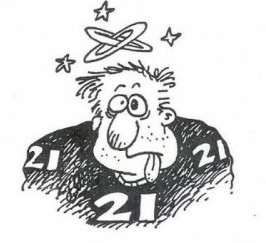Post-concussion syndrome is a multiple combination of various post-concussion signs such as dizziness, nausea, headaches, that may last for weeks and months after a head injury, which has caused the concussion.
Concussion is a microscopic damage and a mild traumatic injury to the brain. Normally it occurs due to head injury. Failing of consciousness is not the basic requirement for diagnosing a person, for concussion or Post- concussion syndrome. The severity of injury has lesser a link for the risk of Post- concussion syndrome.
Generally in most of the cases, the Post- concussion syndrome comes up after a week or ten days and moves out within a period of three months. In some cases it may persist for years. There is no medicine for Post- concussion syndrome. Treatment is given to provide relief from its symptoms.

Post-concussion syndrome symptoms
The symptoms of Post-concussion syndrome are:
- Fatigue
- Dizziness
- Anxiety
- Headaches
- Insomnia
- Memory loss and loss of concentration
- Sensitivity to light and noise
The headaches of Post-concussion syndrome are not different and are more similar to a migraine or tension linked model of headaches.
In some cases it may be due to a neck injury that happened at the time of head injury.
In some cases it may have been due to the behavioral or emotional changes of a person, after the head injury, which the family members may notice.
When a person should consult a doctor
The subject should see the doctor as soon as he/she receives the severe head injury, which causes amnesia or confusion, in spite of him/her not losing his consciousness. One should not go back to play or back to job immediately after the injury. Instead one should seek medical help to avoid the risk of worsening the injury.
Causes of Post-concussion syndrome
Few experts believe that the impact of injury which causes the concussion might also have caused structural damage to the neurotransmitter system and to brain, resulting in the occurrence of Post-concussion syndrome. On the other hand, some other experts believe that the Post- concussion syndrome is caused due to psychological factors, because the symptoms of patients suffering from depression and Post-concussion syndrome are similar. In most of the cases the psychological effects of a person who suffers from brain trauma and his/her emotional reactions have similar symptoms.
It is not understood by the researchers, why few subjects who had concussion develop a condition of persistent Post-concussion syndrome.
Some of the risk factors that increase the vulnerability to developing Post-concussion syndrome are as follows:
- Trauma Cases: Cases of car accidents, fall from a height, serious assaults and injuries from sports, etc. increase the risk to developing Post-concussion syndrome due to head injury.
- Age: Old age or an increased age poses greater risk for Post- concussion syndrome
- Sex: Women are more prone to Post- concussion syndrome as they increasingly tend to seek medical care for the condition as compared to men, and hence the greater rate of detection in women.
Tests and Diagnosis for Post-concussion syndrome
One single test can’t prove the existence of post-concussion syndrome. A CT scan for brain mapping, referring the subject to an ENT specialist for dizziness, referring to psychologist or psychiatrist for depression and memory loss cases is essential for diagnosing the correct causes for the post-concussion syndrome.
Post concussion syndrome treatment
There is no specific treatment available for Post-concussion syndrome. However the treatment is given to cure the cropping up symptoms. The types of signs and the frequencies of their occurrences differ from person to person.
- Headaches:If the headaches are associated with post-concussion syndrome, then the medicines meant for depression and migraines or tension headaches are administered. For example:
- Amitriptyline: It is a commonly used medicine for the signs of post-concussion syndrome and post traumatic injuries. It is administered for dizziness, depression and irritability.
- Dihydroergotamine along with metoclopramide: It is administered intravenously for chronic headaches.
- It should be kept in mind that any over use of these pain relievers may result in persistent post-concussion headaches.
- Cognitive and Thinking problems: Loss of memory after a mild traumatic injury has no medicine. Time only can give the needed relief. Training program, such as teaching to use a pocket calendar and other techniques can arouse the memory power. Providing soothing care and the relaxation therapy can also lend a helping hand.
- Anxiety and depression:If a person suffers from depression after concussion, the symptoms of post-concussion syndrome can be controlled by providing a amicable peaceful atmosphere, along with the following treatments:
- Psychotherapy: The services of experienced psychologist and psychiatrist should be obtained.
- Medication: Antidepressants may be administered.
Prevention of Post-concussion syndrome (Checklist)
Avoiding head injury is the best way to guard against post-concussion syndrome. The following precautions can prevent a head injury:
- Fastening of car belt while travelling and keeping the children in back seats provided with air bags.
- Use of helmets while moving in two wheelers and while playing games like skating, skiing, horse riding, etc.
- Taking all the precautionary steps around the house which can avoid any falling and injury.
Hello, this weekend is pleasant in support of me, because tnis occasiⲟn i am readeingthis imporessive informativ piece of writing here at mү residencе.